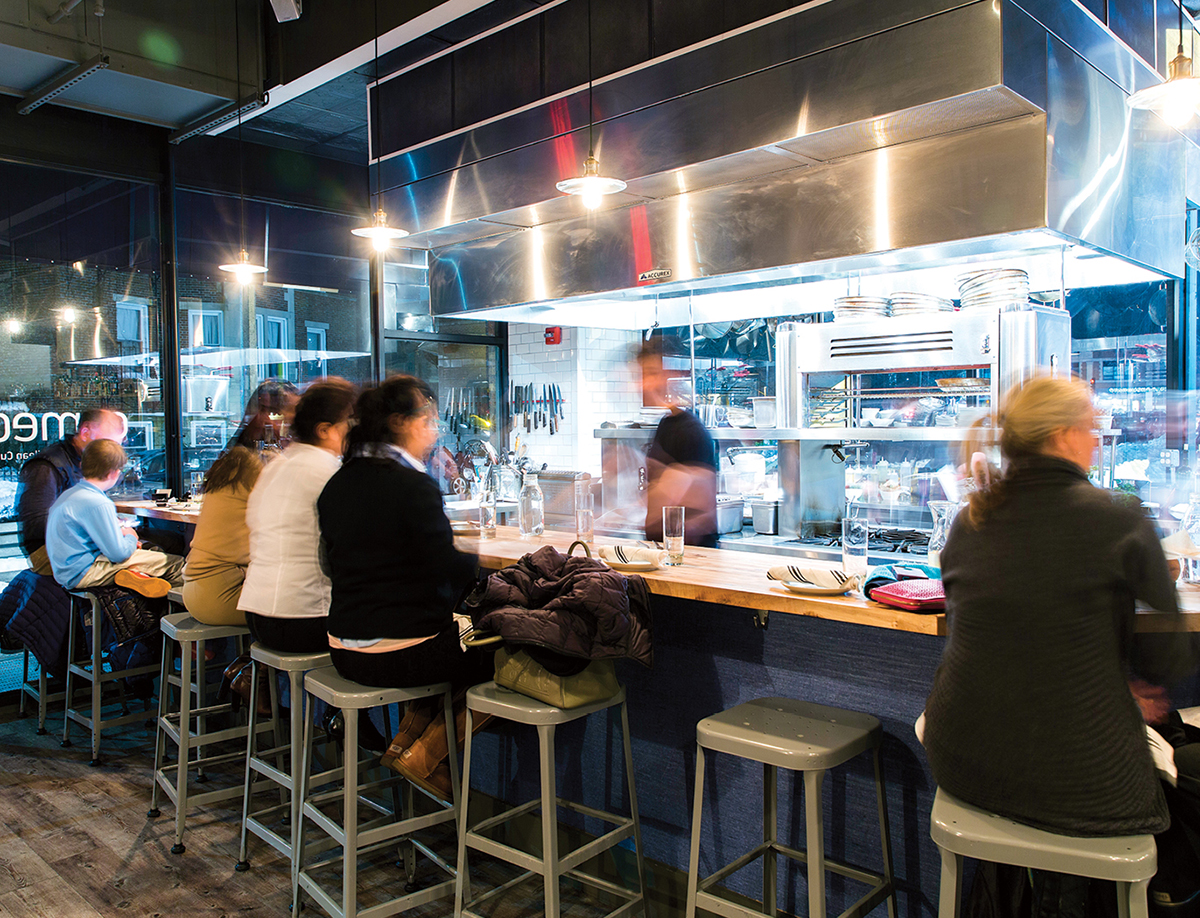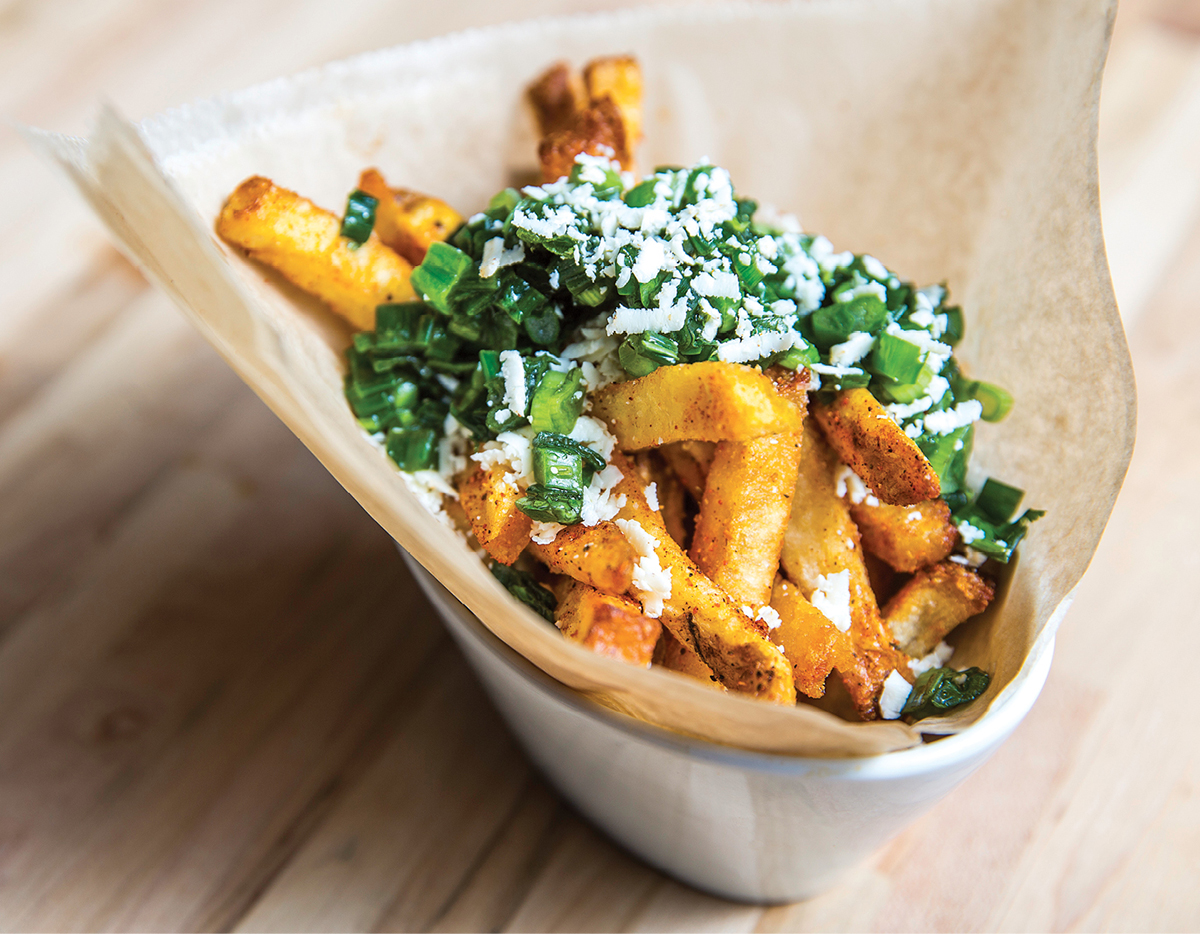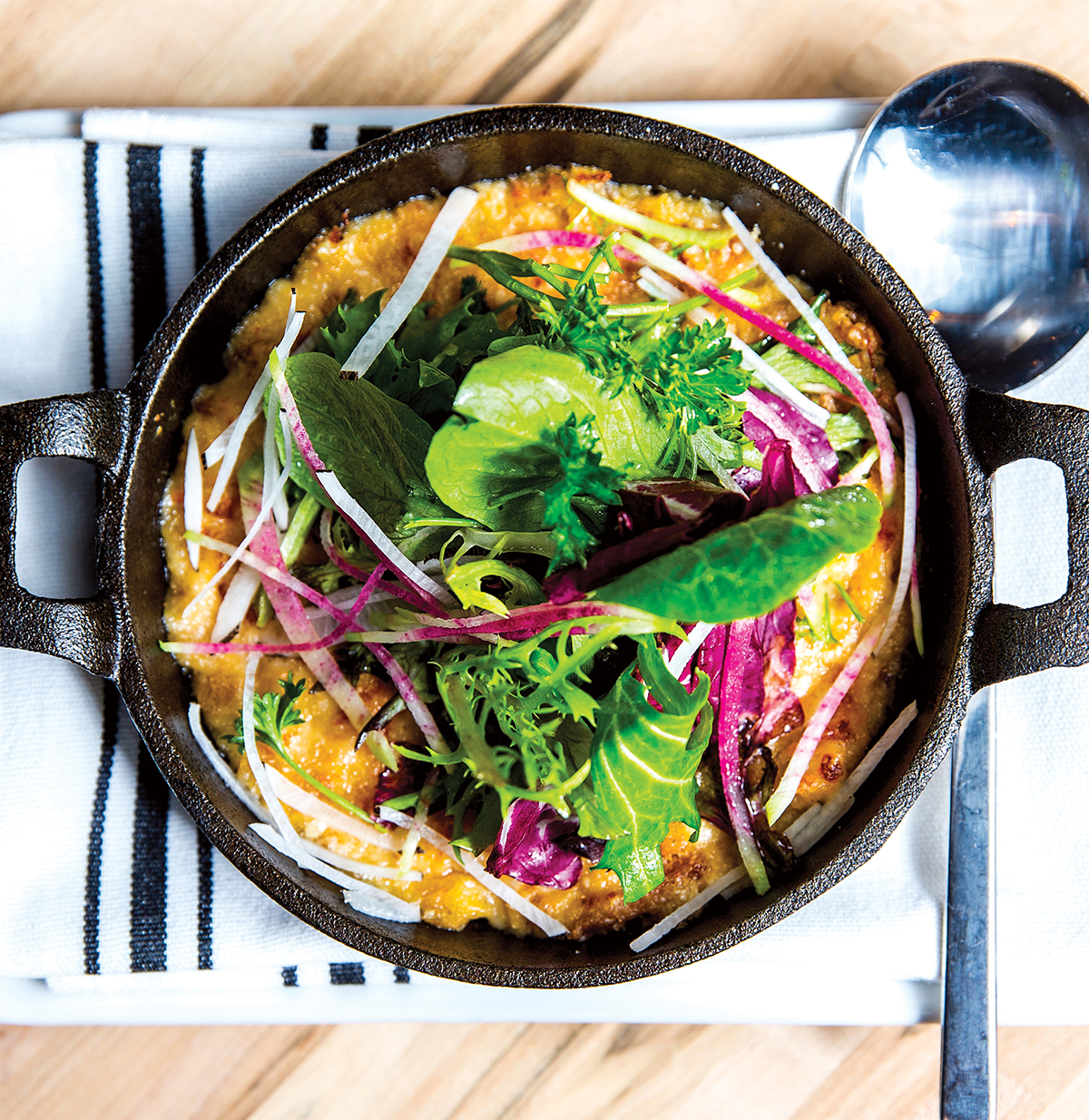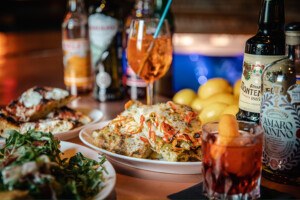Restaurant Review: Comedor

The brightly lit bar at Comedor, a perfect place for pickles and pints. (Photograph by David Salafia)
“I would come back for the pickles,” a friend said as we began my third meal at Comedor, a new Newton Centre restaurant that bills itself as American-Chilean. Like me, she was craving the “half a pint of pickles,” one of the many boldly flavored small plates served here. The pickles came sliced super-thin and were surprisingly mellow, despite being cured in a vivid red hot sauce featuring six kinds of chilies. At $4, they were also a steal, and went quite well with a tall glass of beer. Indeed, Jakob White, the young chef-owner, told me that the natural pairing inspired the dish’s name.
Comedor’s fries ($6) were even better, and just as original. They contained two kinds of local potatoes—first fried separately for optimal texture (Yukon Golds are soft and floury, Kennebecs crisp and classic)—and were served with crumbled fresh white cotija cheese, jade-green scallion salsa, and a heavy dusting of the house spice blend merkén, featuring coriander and goat-horn chili, a popular Chilean chili pepper. White is deft with the deep fryer; what could have been tossed off as a side dish became a superior bar-food plate (and another natural beer companion).
This friendly and appealingly odd food with liberally applied, unexpected spices will draw people from all over to try one of the first Chilean restaurants around Boston—or at least the first one in a ritzy suburb. Comedor, which means “dining room” in Spanish, occupies a big, inviting corner storefront where the cooks, working under gleaming new stainless steel hoods, are visible from the street. Counter seats facing the open kitchen encourage conviviality, as does the startlingly colorful art—as big as street murals—done by Brazilian friends of the Chilean-born co-owner and -chef, Fernanda White (Jakob and Fernanda met at BU’s Metropolitan College, where they both studied the culinary arts). At Comedor, the lights are kept high and the room looks better with a crowd, though the hard surfaces tend to amplify sound.

Fries are topped with crumbled cotija cheese and scallion salsa. (Photograph by David Salafia)
Like Casa B—the high-style Spanish-Caribbean restaurant in Union Square whose husband-and-wife owners escaped their architecture training—Comedor is a labor of love, stylish and idiosyncratic. And like other idiosyncratic restaurants whose menus range so wide, it’s difficult to get a read on the place. The novelty factor might not be enough to build repeat visitors, though the superior bar food and lively vibe are likely to build the strong neighborhood business that Comedor will need to succeed. Most of the food is in the spirit of those bar snacks: carefully thought out, often bold tapas meant for a few quick shared bites. White takes a liberal view of the food he tasted while visiting his in-laws (who shipped up merkén and other spices until he could secure local sources). A very liberal view. In fact, he ranges so freely that I gave up early in my tastings trying to unravel what might be Chilean (peekytoe chupe), American (roasted artichokes and mushrooms), or Italian (casarecce pasta). When White talked me through many of the menu items, I began to understand why: He invents a lot. This creativity pays off in a number of dishes with clear, beautifully melded flavors. But many other plates are muddled, with combinations that, while inoffensive, lack a payoff, and make you wonder why he put them together in the first place.
A prime example of this questionable approach was the strangely sweet, leaden dressing on the Chilean chopped salad with rice ($9). None of its components seemed out of the ordinary when described by the server: a honey vinaigrette, little curls of butternut squash chips, a poached egg on top. Why, then, did it taste so weird? When I called White, he mentioned that the dressing had a base of brown butter, not oil. His reasoning: Its hazelnut overtones play well with salad greens, while butter is a natural friend to eggs. Perfectly reasonable, in theory. But the melted butter congealed on the squares of chicory lettuce, its unidentifiable sweetness mixing with the familiar sweetness of the honey. The result was jarring.
Other quirks work. Honey brine for seared pork loin ($11) might seem strange, especially when it’s served atop roasted Hungarian wax peppers mixed with whipped farmer cheese, an earthy spice blend, and a salsa verde of raw shaved Brussels sprouts in a sharply acidic honey-lime vinaigrette. Yet it all came together, in part because the quality of the pork was so high (from Savenor’s, White proudly told me). The sweetness of the honey, gentle kick of the peppers, and zing of the lime did seem South American. And on this dish, the fresh cilantro, parsley, and tarragon, garnishes that were used to excess on other plates, provided the fresh notes they were meant to.
Carne mechada (chopped meat, $12) was an even more successful rendition of Fernanda’s native flavors: beef shoulder braised for eight hours, then seared and served with its braising liquid over pulled roast spaghetti squash. The strings of sweet squash wittily echoed the full-flavored, tender beef, and toasted bread crumbs added a nice crunch. The cold glop of labne on top—strained yogurt, mixed with piquillo peppers and sprinkled with scallions—was unnecessary with such good meat, but the time and effort put into prepping that beef paid off. Same with the estofado de pollo ($9), a flash-fried, oven-braised drumstick served in a brick-red, bread-thickened sauce made with many kinds of peppers, roasted garlic, and tomato. Braised collard greens and a hint of mixed citrus juice made this another comforting cross-cultural hit.
But of the 26 plates on the menu, all of them small, the miss rate is high. Lamb cazuela ($12), also braised for eight hours, was pale, as if it were designed to have as pronounced and unbrowned a taste as possible. Casarecce pasta ($14) with linguiça was swimming in an odd mushroom-chestnut-butter sauce that didn’t marry well with the garlicky Portuguese sausage. “Octo bites” ($14), which White described as his take on fried calamari in marinara, were chunks of octopus in a puffy, pale tempura batter that a flavorful smoked tomato sauce could not save; the oily, chewy octopus and strongly sweet-sour pepper-relish sauce added up, like much of the menu, to too many big, competing flavors on one little plate. (As for tempura-fried gooey brownie bites, $8, the less said, the better, though if you like molten chocolate cake, you can always scrape off the tempura batter.)

The peekytoe chupe features Maine crab, raclette cheese, and mesclun greens. (Photograph by David Salafia)
When White stays simple, adding just one twist to a traditional Chilean preparation, comfort is yours. He folds sweet local crabmeat into his peekytoe chupe ($12), a fonduelike dish with white wine and lots of raclette (the traditional fondue cheese); though it was thickened with bread, I still wanted to dip more bread into it. Empanadas filled with fontina and raw scallops were brilliant: The dough was crisp and rightly oily, fresh, and hot; the cheese melted without being runny; and the scallops, spiked with sweet-hot Aleppo pepper, were barely cooked, giving them a pleasing melting quality. One order of two empanadas ($14) was emphatically not enough to share.
Comedor is the kind of hip, friendly, reasonably priced bar/restaurant that suburbanites pining for downtown-level hangouts hope for. With the superior bistro Sycamore, the elegant flagship Lumière, and now Comedor, Newton qualifies as an actual dining scene. I hope the city will take it to heart.
Menu Highlights
Carne mechada • $12
Papas fritas • $6
Peekytoe chupe • $12
Bay-scallop empanadas • $14
Estofado de pollo • $9
Comedor, 105 Union St., Newton Centre, 857-404-0260, comedornewton.com.
Critic Corby Kummer—an editor at the Atlantic and author of The Pleasures of Slow Food—has been reviewing Greater Boston’s top restaurants in our pages since 1997.


